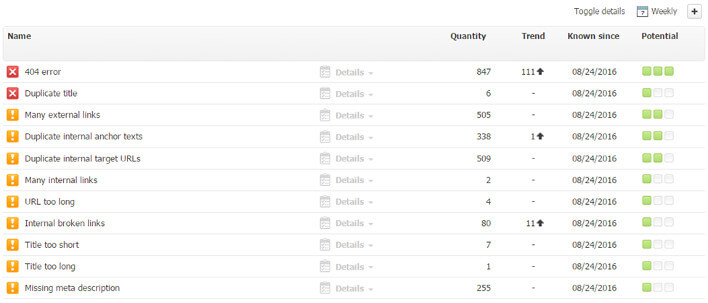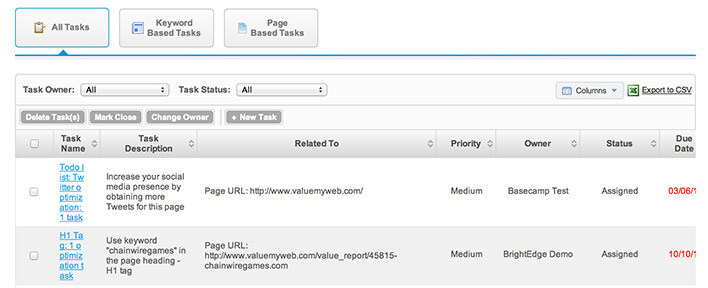
Enterprise SEO platforms such as Searchmetrics, Linkdex and BrightEdge are used by a large number of brands and agencies. As the landscape and industry has evolved, are these tools still worth investing in?
Recently, I've noticed clients challenging whether these enterprise platforms are truly necessary. Could the budget being spent on them be diverted elsewhere to drive greater performance gains?
Most of the platforms' capabilities can broadly be broken down into the following categories:
Probably the biggest factor which determines their usefulness is simply their usage. Teams need to be fully trained in the platform's capabilities and using them on a daily basis to get the best value. Assuming usage is good, let's take a look at each of their core capabilities and discuss whether enterprise SEO platforms are still relevant.
1. Performance and insightsIn my opinion, this is the number one reason to be using one of the platforms.
Performance and reporting is the core function of the platforms and is the most useful feature. Most enterprise SEO platforms calculate the search visibility of websites. Each platform has their own nuances for calculating visibility, but essentially it is calculated by taking a number of keywords, understanding the search volume, and then applying an assumed click-through rate.
Across large data sets, and through tagging, this data can be used to pull some pretty powerful insights. Furthermore, the platforms often have "public" databases consisting of tens of millions of keywords that enable you to do instant analysis on any given domain, see their performance in organic search, and view what keywords are driving their performance.

SEO visibility is a great way to assess the performance of a given site in organic search
SEO platforms remain the best and (in some instances) the most cost effective way of collecting this data. Because they've been collecting the data for a long time, there is historical data which may reveal trends or issues that a snapshot in time may not show.
You can't just rely on the public databases, though, as visibility scores are often skewed (for better or worse) by brand terms. Only by setting up your own projects with properly tagged up keywords will you be able to pull insights that you can act on.
For me, this is by far the best reason to invest in an enterprise-level SEO platform.
2. ForecastingThe next best reason to invest in a platform is for the forecasting capabilities.
Forecasting is a critical component of SEO to not only secure budget, but also to push through recommendations and build business cases for content. The more robust and better methodology, the more likely it is to be accurate and more likely stakeholders will buy into it.
Having large keyword data sets and the ability to automate position uplifts can create pretty strong forecasts. I can remember almost ten years ago painfully replicating this in Excel. No more. Platforms will help you get budget and get campaigns live. For agencies, this feature alone may justify the fee of the platform.
Additionally, they'll take AdWords CPC data (which sometimes can be questionable) and provide you with an equivalent media value, i.e. what it would cost if you were to buy this traffic in paid search. This makes investment comparisons versus other channels easier, and usually favors SEO.
3. Technical optimizationSEO platforms by their very nature aim to provide a range of functionality. This includes technical optimization tools.
Each SEO platform will have its own crawler, with an engine that generates technical recommendations. This is an area where I feel enterprise-level SEO platforms are weaker and could improve.
I think it's fair to say that this functionality generally attracts a more entry-level technical SEO. Platforms can provide useful scorecards, suggest priorities and chart issues. These cloud-based crawls can be scheduled to create dashboards and be shared with various stakeholders.
The more sophisticated SEO will be more likely to rely on cloud based crawlers such as Deepcrawl, or alternatively desktop based crawlers such as Screaming Frog. They provide more control over crawling options, and using the crawl data to extract insights.
I would consider the technical capabilities of the platforms as a 'nice to have', but nowhere near strong enough to justify the cost of a platform.

Searchmetrics will prioritise the SEO technical issues your site is suffering from
4. Content marketingI think the platforms are missing a real trick here.
There is much debate how to evaluate a website to understand its algorithmic value and influence. Ways such as page authority and domain authority are only third party metrics. These metrics ultimately attempt to qualify how trustworthy or authoritative a given webpage or domain is perceived by search engines.
For me, there are fewer better ways of measuring how much Google likes a website then to see whether it actually appears in search results.
Whenever I analyse whether I want to obtain a link from a website, I'll run it through a tool to see how many queries Google ranks it for, and how highly. If it ranks for a lot of queries, I'll work to the assumption considers it a useful and valuable website, and therefore it would be great to get a link from.
The people sitting on the best data to do this sort of analysis are the SEO platforms. They arguably know more about the visibility of websites than anyone else. I don't think any of them are utilizing to the best ability though.
Linkdex probably do the best job of this with 'Link Influence'. They don't disclose their secret sauce, but part of this metric takes into consideration the visibility of a domain. There are apparently dozens of factors it takes into consideration, but I'd like to see visibility heavily up weighted in this metric.
Link data is a key interest of most SEOs when it comes to content marketing.
None of the SEO enterprise platforms make an effort to build the largest index of link data. Some take the right approach of using Majestic data, and then adding value to it. This is absolutely the right approach to take.
Otherwise the tools look to form their own strengths with more unique content marketing features. For instance, a key strength of Linkdex is its author influencer tool, while Searchmetrics has 'Content Optimisation' which analyses search results for a given keyword and provides guidance around the depth and topics.
I think it's fair to say that it's not worth investing in a SEO platform with the intention of attaining more link data. However, some of the content marketing insight tools are a 'nice to have', and content marketing teams should use them more often than they do.

Linkdex enables you to identify the top authors for a given keyword or topic
5. Campaign managementFinally, enterprise SEO platforms offer workflow/ campaign management capabilities.
The effectiveness of using your SEO platform as your workflow tool will largely depend on the amount of other functionality you're using in the tool. Integration with the technical recommendations, and outreach tools can make this seamless.
I personally haven't encountered many teams using the workflow tools, probably because they're not using the full toolset. Many agencies will prefer to use Buzzstream or a PR database like Gorkana. Basecamp can provide a more sophisticated project management tool, and can be used for multiple channels, not just organic search.
I don't think it's controversial to say out of all the features of a platform, the workflow management is the least important reason to invest in one.

Brightedge will take your technical issues, and in just a few clicks a task can be created and assigned to a member in the team
So, should you be using a SEO enterprise platform?In short, yes. The platforms provide great visibility and insight capabilities. This is the main reason to invest, and most other features should be considered as a "nice to have." If budget permits, use a platform and compliment it with additional specialist tools.
The platforms need to offer a range of tools, and it's unrealistic for them to provide the best features in every area. Given their strongest area is visibility, it will be interesting to see how they deal with a crackdown on scraping results pages for rankings, and the slow withdrawal of search volume data. They will need to still provide this functionality to maintain their revenue.
Each tool has its own advantages and disadvantages. Some are better at technical optimization recommendations than others, whilst others excel at competitor analysis. With such a wide range of options available, it's key that you understand what your requirements are to know which solution is right for you.
Some opinions expressed in this article may be those of a guest author and not necessarily Search Engine Land. Staff authors are listed here.
About The Author Ian Bowden is Head of Search at Ecselis (Havas Group) and is ultimately responsible for Search operations in the UK. Ian joined Havas Group in 2010 and has ten years of experience, having first started in SEO building affiliate websites to pay his way through university. Today, he leads one of the biggest UK Search outfits, and is passionate about driving both performance and integration for clients. In 2012, he was named in Media Week's "30 under 30" list in recognition of his results for clients.Source: Should you still be using an SEO enterprise platform?
No comments:
Post a Comment